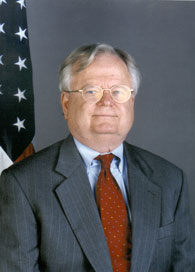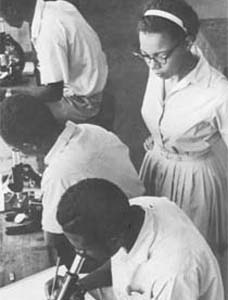January 14, 2005: Headlines: COS - India: COS - Malawi: Diplomacy: Iraq: Newsday: By just concentrating on four provinces in and around Baghdad, says RPCV Robert Blackwill, we are getting a distorted and overly pessimistic picture of what the situation in Iraq is really like
Peace Corps Online:
Directory:
Malawi:
RPCV Robert Blackwill (Malawi) :
Special Report: Diplomat, National Security Advisor, and Malawi RPCV Robert Blackwill:
January 14, 2005: Headlines: COS - India: COS - Malawi: Diplomacy: Iraq: Newsday: By just concentrating on four provinces in and around Baghdad, says RPCV Robert Blackwill, we are getting a distorted and overly pessimistic picture of what the situation in Iraq is really like
By just concentrating on four provinces in and around Baghdad, says RPCV Robert Blackwill, we are getting a distorted and overly pessimistic picture of what the situation in Iraq is really like

By just concentrating on four provinces in and around Baghdad, says RPCV Robert Blackwill, we are getting a distorted and overly pessimistic picture of what the situation in Iraq is really like
Looking at Iraq, through a glass not so darkly
January 14, 2005
Sometimes it's worthwhile to pause for a moment and listen to the guy who says the glass is one-quarter full.
Such is the view of Special Envoy Robert Blackwill, who had been the administration's man in Iraq for much of the last six months.
Blackwill, writing in The Wall Street Journal last week, argued that the "boom factor" - an epidemic of bombings in the Sunni triangle - is not the right way to measure what is happening there now and, more important, what will happen in the future. For all the violence in the Sunni-dominated middle of the country - and about that there is no arguing - Blackwill says there are also good things happening in the Shia-dominated south and Kurdish north. By just concentrating on four provinces in and around Baghdad, says Blackwill, we are getting a distorted and overly pessimistic picture of what the situation in Iraq is really like.
His point is that there will be elections on Jan. 30 and there will be healthy participation in the south and in the north. That the Sunnis in the middle of the country will participate in far lower numbers and will elect far fewer of their candidates is unfortunate, but will not undercut the legitimacy of the election.
Will the elections be considered legitimate? It's probably not wise to make any statements about that until after the elections are held. But Blackwill makes a few points about the general situation there worth considering.
One is that there is a semblance of normalcy in wide swaths of Iraq in both the south and the north. And also a determination to vote on Jan. 30. The impression that everything in Iraq is a chaotic mess is not true.
Blackwill also points out the insurgency is concentrated in the Sunni-controlled middle of the country. The Sunnis account for only about 20 percent of the population of Iraq and the insurgency represents something less than a majority view of the Sunnis. Even if none of the Sunnis participate in the election, about 80 percent of the population could.
But a minority of a minority can make a lot of noise, do a lot of damage and exert power well beyond its numbers. Just look at the Bolsheviks in Russia. Although a tiny faction, they came to power because they were more ruthless than their opponents. And ruled for 70 years.
To be fair to Blackwill, his argument isn't that the glass is only a quarter full - he says it's half full or about to get there and beyond. And he suggests that the election could be the turning point.
On that there is reason to be skeptical. There is no indication that the election will cause the insurgents to call a cease-fire. Post-election could well be as bloody as pre-election. But for Iraq to hold together there must be some significant Sunni participation in the government.
My question is, what is the administration's plan to try to bring the Sunnis in after the election? Is there a plan? The election is to choose an Assembly that is to write a new constitution and submit it to a referendum by year's end. How can there be an accepted constitution if a significant minority rejects it? There has to be a way to allow Sunnis to participate in the constitution-writing process, some attempt to isolate the radical rejectionists from the more moderate Sunnis.
Blackwill is right that things in Iraq are not as bleak as the daily headlines and television reports suggest. The economy is improving, if slowly, and large sections of the country outside the Sunni triangle have stabilized. Iraq has not devolved into another version of Lebanon in the 1970s: a general civil war with Shia fighting Sunnis fighting Kurds or regional outside powers sending forces into the country.
But that is the empty-glass analogy - and too depressing to contemplate.
Subscribe to Newsday home delivery
Copyright © 2005, Newsday, Inc.
When this story was posted in January 2005, this was on the front page of PCOL:
 | Ask Not
As our country prepares for the inauguration of a President, we remember one of the greatest speeches of the 20th century and how his words inspired us. "And so, my fellow Americans: ask not what your country can do for you--ask what you can do for your country. My fellow citizens of the world: ask not what America will do for you, but what together we can do for the freedom of man." |
 | Latest: RPCVs and Peace Corps provide aid
Peace Corps made an appeal last week to all Thailand RPCV's to consider serving again through the Crisis Corps and more than 30 RPCVs have responded so far. RPCVs: Read what an RPCV-led NGO is doing about the crisis an how one RPCV is headed for Sri Lanka to help a nation he grew to love. Question: Is Crisis Corps going to send RPCVs to India, Indonesia and nine other countries that need help? |
 | The World's Broken Promise to our Children
Former Director Carol Bellamy, now head of Unicef, says that the appalling conditions endured today by half the world's children speak to a broken promise. Too many governments are doing worse than neglecting children -- they are making deliberate, informed choices that hurt children. Read her op-ed and Unicef's report on the State of the World's Children 2005. |
 | Our debt to Bill Moyers
Former Peace Corps Deputy Director Bill Moyers leaves PBS next week to begin writing his memoir of Lyndon Baines Johnson. Read what Moyers says about journalism under fire, the value of a free press, and the yearning for democracy. "We have got to nurture the spirit of independent journalism in this country," he warns, "or we'll not save capitalism from its own excesses, and we'll not save democracy from its own inertia." |
 | Is Gaddi Leaving?
Rumors are swirling that Peace Corps Director Vasquez may be leaving the administration. We think Director Vasquez has been doing a good job and if he decides to stay to the end of the administration, he could possibly have the same sort of impact as a Loret Ruppe Miller. If Vasquez has decided to leave, then Bob Taft, Peter McPherson, Chris Shays, or Jody Olsen would be good candidates to run the agency. Latest: For the record, Peace Corps has no comment on the rumors. |
 | The Birth of the Peace Corps
UMBC's Shriver Center and the Maryland Returned Volunteers hosted Scott Stossel, biographer of Sargent Shriver, who spoke on the Birth of the Peace Corps. This is the second annual Peace Corps History series - last year's speaker was Peace Corps Director Jack Vaughn. |
Read the stories and leave your comments.

Some postings on Peace Corps Online are provided to the individual members of this group without permission of the copyright owner for the non-profit purposes of criticism, comment, education, scholarship, and research under the "Fair Use" provisions of U.S. Government copyright laws and they may not be distributed further without permission of the copyright owner. Peace Corps Online does not vouch for the accuracy of the content of the postings, which is the sole responsibility of the copyright holder.
Story Source: Newsday
This story has been posted in the following forums: : Headlines; COS - India; COS - Malawi; Diplomacy; Iraq
PCOL16697
69
.












